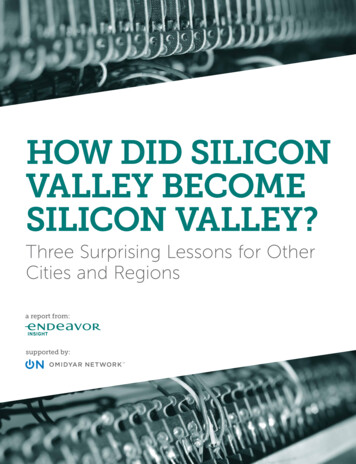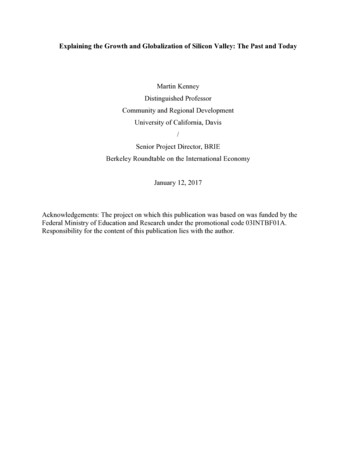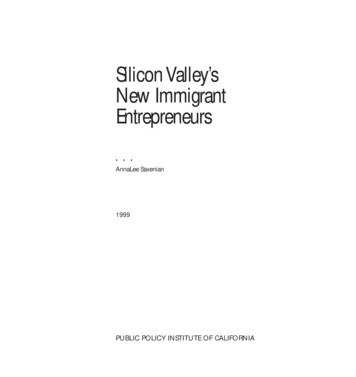Transcription
2013 Silicon ValleyCareer GuideA Wealthfront eBookAndy Rachleffwith Elizabeth MacBride
table of contents4Video PrefaceAn interview with Wealthfront CEO and author AndyRachleff5About the Author6Introduction: Why Managing Your Career Well Is So ImportantYou will earn far more money by managing your career wellthan by managing your investments well. The happinessyou derive from your career may be nearly as important asthe happiness you derive from the rest of your life.9Chapter I: Decide Where To WorkYour choice of company matters far more than your job titleor even your compensation. Your best risk-adjusted bet ifyou are just starting out, or if you haven’t succeeded yet, isto join a mid-sized company with momentum. You mightalso want to consider the person you’ll be working for andwhether she can be a mentor.15Chapter II: Don’t Be An Offer CollectorCandidates who have been successful tend to focus theirjob searches. They look for the company with the highestodds of succeeding. If you spend time collecting offers,good companies won’t want to hire you: They will see yoursearch for the highest compensation or biggest title as asign you haven’t yet succeeded.18Chapter III: Get A Fair Compensation PackageYou need enough to live on, and you’ll want to make sureyou will be compensated within the industry norms. Ourcompensation tool can help.
21Chapter IV: Ask These 12 Questions About Your OptionsWhat really matters is the percentage of the company youroptions represent, and the rapidity with which they vest.These questions will help you understand how yourprospective employer treats options.26Chapter V: Seek A MentorA second but slightly less important factor than the qualityof the company is your mentor. A great mentor gives yourcareer an updraft.29Chapter VI: Decide How Long to StayFor most people, the right length of time is probably aboutfour years, which is, coincidentally, when most optionspackages are fully vested. But there are corner cases: If youare unhappy about a circumstance that is unlikely tochange, you should leave a job at any point. And, if you arereally happy, it’s fine to stay for longer than four years.33Parting WordsIf you’re just starting out, pay attention to the fundamentalsI’ve outlined in this book. If you’ve made some missteps, myadvice is the same: Follow the fundamental lessons, even ifit means taking what feels like a backward step in yourcareer. Success breeds success. If you haven’t succeededyet in your career, my advice is to keep trying until you do.36About Wealthfront37Appendix A: Mid-Size Companies With Momentum
Video PrefaceAuthor and Wealthfront CEO Andy Rachleff previews the book.( Internet access required )
About the AuthorAndy Rachleff is president and chiefexecutive officer of Wealthfront,the largest and fastest growingsoftware-based financial advisor. A cofounder of Benchmark Capital and afaculty member at Stanford GraduateSchool of Business, Andy has helpedmany entrepreneurs and executives inSilicon Valley achieve success. Heco-founded Wealthfront to bring sophisticated investment adviceto everyone.After receiving an undergraduate degree from University ofPennsylvania, Andy came to Silicon Valley in 1982 to attendStanford Graduate School of Business (GSB). Upon graduation hejoined what was then a nascent venture capital community.He spent 10 years as a general partner with Merrill, Pickard, Anderson& Eyre (MPAE) before co-founding Benchmark, where he wasresponsible for investing in a number of successful companies,including Equinix, Juniper Networks and Opsware. He wasfrequently named to Forbes’ The Midas List as a top techventure investor.Along with serving as Wealthfront’s CEO, Andy continues to teach atStanford GSB and is a member of the board of trustees and vicechairman of the endowment investment committee for Universityof Pennsylvania.
IntroductionManage Your TechCareerYou will earn far more money by managingyour career well than by managing yourinvestments well. The happiness you derivefrom your career may be nearly as importantas the happiness you derive from the rest ofyour life.It may sound strange for the CEO of an investment managementfirm to say this, but managing your career well is much moreimportant than managing your investments well.Good investment management — using low-cost ETFs and low-feeadvice — can mean higher returns in your investment portfolio.Over time, that might add up a lot of money, maybe hundreds ofthousands of dollars on larger portfolios. But the economic
rewards that follow from good career decisions in the technologyindustry are potentially much larger.That’s why we’ve produced this eBook to help our clients managetheir careers. Over my 25-year-career as a venture capitalist, and asa lecturer at the Stanford Graduate School of Business, I’ve seenmany people in Silicon Valley achieve their goals. I’ve seen manywho haven’t because they didn’t understand the Valley’s drivers ofsuccess: great companies, a unique tolerance for failure and aculture of measured risk-taking.Maximize the returnI’m not suggesting money should be your first concern whenyou think about your career. People do the best work, and have thebest chance of great success, if they do what they love on aday-to-day basis.So, work at what you love — and then, maximize the return onyour work.Choosing the right tech companies to work for is the single mostimportant factor in your career success. Choice of companytrumps position, salary and even the size of your equity package. Asmall equity stake in a big success is exponentially more valuablethan a big equity stake in a failure or a minor success.I illustrate the importance of growing the size of the pie to one’sshare of pie to my entrepreneurship students at the StanfordGraduate School of Business by reminding them of the formula fora circle’s circumference versus its area. The formula forcircumference (a proxy for share of pie) is linear (2πr) vs. theformula for area, which is exponential (πr²).When technology companies win, they win big. There’s no way topredict exactly how much you’ll make if you work for one of thosewhy managing your career well is so important7
winners when it goes public, but I can give you a sense of the value.Consider: the typical successful public technology companygenerates revenue of 500k per employee, and has a marketcapitalization value of 5 to 10 times revenue. To find the value peremployee, we multiply the revenue per employee by the typicalmarket capitalization/revenue ratio. We can then multiply thatnumber by .15 — the percent of shares that employees excludingexecutives typically own.It’s a rough calculation, but it gives us 375,000 – 750,000 for thetypical employee in a typical IPO. That’s more than three to sixtimes the average pay at a tech startup — 112,000 in 2011, accordingto our data.With any luck, and if you follow my advice, the payoff can bemuch larger.This eBook can help you understand how to choose your first job,how to negotiate your pay, how long to stay, and other lessons foryour career. To explore more of our knowledge about success overthe entire Silicon Valley life cycle, check out our blog:blog.wealthfront.com.Andrew S. RachleffCEO Wealthfrontwhy managing your career well is so important8
Chapter IDecide Where ToWorkYour choice of company matters far morethan your job title or even your compensation.Your best risk-adjusted bet if you are juststarting out, or if you haven’t succeeded yet, isto join a mid-sized company with momentum.You might also want to consider the personyou’ll be working for and whether she can bea mentor.Every year, my students at Stanford GSB who want to work forstartups ask me for advice on which one they should join.I disappoint them by recommending that they not go work fora startup at all. I tell them three words I know it’s hard for them tohear: You’re not ready.
I prefer to see them take their first jobs after graduation at mid-sizedcompanies with momentum, not startups, because mid-sizedcompanies with momentum are thecompanies most likely to bebig successes.Everyone wantsto recruit orback peoplefrom successfulcompanies.Why is success so important? Youget more credit than you deservefor being part of a successfulcompany, and less credit than youdeserve for being part of anunsuccessful company. Successwill help propel your career. At afast-growing company, chances are good you’ll have a higherposition two years after you join. At a slow-growth company, nomatter how good a job you do, you won’t have the sameopportunities to advance.When it comes time to leave the successful company, you’ll be ableto write your own ticket. No one will remember if you wereemployee 20 or 120. Everyone wants to recruit or back people fromsuccessful companies because they know/ think people carry thelessons of success with them.You also may gain something that’s even more valuable from thatfirst job: insight. If you’re part of a company that’s the leader in amarket for which you have a passion, you’re more likely to developa unique insight that could lead to a great company of your own.Facebook’s LessonPerhaps the best illustration of the way a successful company putsa halo over careers is Facebook. Back in 2006 and 2007, a handful ofmy students were considering job offers from what was then a midsized company with about 50 million in revenue. Some of mystudents were on the verge of rejecting those offers: Dreaming ofDecide where to work10
startups, they believed that a job at a company already on a pathto rapid growth would be boring.Some of them listened to my advice, took jobs at Facebook, andare now benefitting. They are now able to start their own ventures,become venture capitalists or take their pick of jobs at hotcompanies. They’re writing their own tickets.Facebook is a rarity, of course: its market capitalization is so largethat even employees who joined fairly late in the game got bigpayouts. In most cases, joining a mid-sized company, even onewith enough momentum to reach an IPO while you’re there, won’tmake you rich.Making money is not the pointfor most of my students,anyway. They take my classesbecause they’re the kinds ofpeople who want to make animpact on the world. Becausethey have that desire, andthey’re impatient to fulfill it, some of them come away quitedisappointed when I suggest to them that they ought to wait.Insight, not energy,is the key to successin technology.But the odds are that your startup is going to fail. Why take thatchance early in your career? If you’re willing to take three years towork for a company with momentum, then your experience atthe mid-size company will allow you to do something more amazingin the future. Not many people get multiple shots at starting acompany, so why not put your best foot forward?By the way, if it hasn’t been obvious already, I don’t buy the adagethat you should start a company when you’re very young, becausethat’s when you have the energy. Insight, not energy, is the key tosuccess in technology, and insight doesn’t arrive on a particulartimetable.Decide where to work11
Why Mid-Size Private Companies?After we talk, I offer to give my students a spreadsheet of 45 – 50private companies, U.S.-based or with a strong presence here, thatfit my description of an ideal company to work for. I compile this listeach year by talking to about 10 – 15 venture capitalists at thepremier venture firms.Now, I’m sharing an expanded version of my list with you (Table 1, p.13), featuring 100 private companies.All our advice on Silicon Valley careers is based on a simple idea:that your choice of company trumps everything else. It’s moreimportant than your job title, your pay or your responsibilities.The private companies we’ve listed have revenue between 20 and 300 million. They’re growing fast and appear likely to maintaintheir momentum for the foreseeable future. It’s important that yourpotential employer have enough momentum to keep growingrapidly until you decideto leave — probably after aboutthree or four years if you want toassure yourself of theaforementioned halo.Your choice ofcompany trumpseverything else.Why not a startup? Most startupsfail. That means their risk / rewardratios don’t look good. That concept is important in investing, too:You want the highest possible return for the least amount of risk.We pay a lot of attention to risk / reward ratios at Wealthfront tobuild our clients’ portfolios; you should apply the same sort ofthinking when it comes to your career.Why the upper limit of revenue? Above a certain company size, thelessons you learn are no longer applicable to the startup youeventually want to be part of. For example, if you join FacebookDecide where to work12
or Google today, you’ll spend most of your time learning howto take advantage of your company’s massive market position.Startups don’t have that problem so those lessons learned arenot of much value. Company-building lessons tend to translate untilaround 300 million of revenue, though that is extremely subjective.What Happens Next?After those first jobs, some of my former students have takensenior positions with hot startups. Others have foundedcompanies, and had an easier time getting funded than theyotherwise could have. They were smart: They took the timeto make themselves ready for their startup careers. Now, thosecareers are taking off.Table 1: Mid-Size Companies With MomentumCOMPANY & DESCRIPTIONLOCATION37signalsFrustration-free web-based apps forindividuals & small businesses.Chicago, ILAcronisStorage solutions for mission-criticalapplications.Burlington, MAActifioProtection & Availability Storage (PAS) -recover anything instantly.Waltham, MAAdconion Media GroupMulti-channel digital distribution platformwith 687M monthly uniques.Santa Monica, CAAerohive NetworksEnterprise WiFi Solutions VendorSunnyvale, CADecide where to work13
AirbnbCommunity marketplace for people to list,discover, and book unique spaces aroundthe world.San Francisco, CAAppDynamicsApplication Performance ManagementSan Francisco, CAApptioManaging the business of IT.Bellevue, WAArista NetworksSoftware defined networking.Santa Clara, CAAtlassianInnovative Enterprise Software SolutionsSydney &San FranciscoBirchboxA beauty product discovery serviceNew York, NYBit9Advanced Threat ProtectionWaltham, MABOKUMobile Payments PlatformSan Francisco, CABonobosE-commerce driven men’s retailerNew York, NYBoxCloud Content ManagementLos Altos, CABraintreeOnline and mobile payment processingChicago, ILClick Here for the Full Table (Appendix A)Decide where to work14
Chapter IIDon’t Be An OfferCollectorCandidates who have been successful tend tofocus their job searches. They look for thecompany with the highest odds of succeeding.If you spend time collecting offers, goodcompanies won’t want to hire you: They willsee your search for the highest compensationor biggest title as a sign you haven’t yetsucceeded.In the last chapter I described the importance of being associatedwith success in your first job. Success gives you experience thatmakes you more marketable. With success comes the opportunityto move to another company with far greater equity upside or theaura to raise money for your own start up. Success gives youmotivation, too: People who have tasted success want more.
I can always identify people who have yet to succeed because theyattempt to collect numerous offers before choosing their next job.You might think this is a good idea. Nothing could be further fromthe truth.Unsuccessful people choose jobs based on the best offerPeople who have never experienced a big success in their careersusually choose their next job based solely on which companyoffers the highest compensation or the biggest job title. They don’tunderstand that the quality ofthe company matters farmore than the compensationor the job title, or they havelittle faith in their ability tochoose which company willbe most successful. They tryand get as much as they can,as early as they can. This oftenleads to a poor companychoice, which creates avicious cycle.The quality ofcompany you joinhas a far biggerimpact on your networth than the sizeof the compensationpackage.At Wealthfront, we quicklyfilter out offer collectors. They probably haven’t been successful —they are highly unlikely to bring the skills we need to improve.Successful candidates look for successCandidates who have been successful tend to focus their jobsearches. They look for the company in a space they enjoy with thehighest odds of succeeding. They look for the same qualities anoutstanding venture capitalist does: a compelling and differentiatedvision, a large potential market, an unfair advantage and modestcapital requirements. I believe they recognize these qualitiesbecause they have seen them before in their previous jobs.Don’t be an offer collector16
Once they find that company, they attempt to negotiate a fairdeal (see Wealthfront’s Startup compensation tool for whatconstitutes a fair salary and equity offer) with just that company,rather than collect more offers. I am always happy to pay upfor this kind of candidate, because the leverage she brings willlikely be great.Success is a proxy for judgmentSelection of more than one successful company is often usedby sophisticated hiring managers as a proxy for good judgment,perhaps the most important quality a candidate can have.It’s something I recommended to all my portfolio companieswhen I was a venture capitalist. That’s not to say someonewho hasn’t worked for a successful company can’t be a great hire.It’s just that the odds favor the successful person.I realize this advice is likely to be uncomfortable for many peoplewho haven’t yet worked for a company that succeeded. Myadvice to them: Focus your next job search on a company thatalready has tremendous momentum so you can be assuredsuccess. You may not earn as large an equity stake as you wouldlike in the short term, but you are likely to be far better off in thelong term.Don’t be an offer collector17
Chapter IIIGet A FairCompensationPackageYou need enough to live on, and you’ll want tomake sure you will be compensated withinthe industry norms. Our compensation toolcan help.You’re talking to a great company, and they’re offering you a jobyou love. Now it’s time to figure out how you’ll be compensated.The quality of the company is far more important than yourcompensation, but you’ll want to get what you’re worth in themarket. To help you do that, we created a tool (Figure 2) thatshows typical compensation in technology companies for differentpositions.Don’t Negotiate Too MuchWell-run technology companies have compensation budgets, andyour position will fall within a particular tier. A company can’t offer
you more money without taking money from the budget foranother position.If an executive asks you to name your salary first, ask them what theexecutive believes is fair. You can use our Tool to determine wherethe offer falls in comparison with the market, in terms of equity andcash. The tool allows you to look at compensation across 17 kindsof job functions, including software engineering, marketing, andproduct management.We broke the compensation down by job level, company size —ranging from the tiniest startups to companies with more than 100people, and by four different regions.As you’ll see if you play with the tool, smaller companies tend togive more equity compensation.Compensation inthe Bay Area alsotends to be higherthan in other techregions in thecountry.Figure 2: Wealthfront’s Compensation ToolThe mean cashcompensationacross all techstartups in all themarkets was 112,000. The meanequitycompensationacross all techstartups across allmaturities in all themarkets was .072%.get a fair compensation package 19
If you must name an amountIf at some point during the negotiation you’re asked to name anamount or an equity stake, you can use our Tool to decide onreasonable numbers. Don’t ask for an amount that is far above theaverage; the company most likely won’t break its budgets to hireyou, and you will have damaged the relationship right from thebeginning.Compensation inthe Bay Area tendsto be higher than inother tech regionsin the country.If you’re going to ask for areasonable increase in theoffer, ask for more equity.Getting another .1% can leadto a hell of a lot more moneythan another 10,000 ofsalary. In fact, we believe thatto live in Silicon Valley, youneed to earn an equity stakeworth at least a few hundred thousand dollars. That means you’llneed to make at least one winning bet on a successful company.Based on my experience, most companies will offer you a fair wageand a fair equity package. Those that don’t are those you don’twant to work for.get a fair compensation package 20
Chapter IVAsk These 12Questions AboutYour OptionsWhat really matters is the percentage of thecompany your options represent, and therapidity with which they vest. These questionswill help you understand how yourprospective employer treats options.Next time someone offers you 100,000 options to join theircompany, don’t get too excited.Over my 30-year career in Silicon Valley, I’ve watched manyemployees fall into the trap of focusing on the number of optionsthey were offered. (Quick definition: A stock option is the right, butnot the obligation, to buy a share of the company’s stock at somepoint in the future at the exercise price.) In truth, the raw number isa way that companies play on employees’ naiveté. What reallymatters is the percentage of the company the options represent,and the rapidity with which they vest.
When you receive an offer to join a company, ask these 12questions to ascertain the attractiveness of your option offer:1. What percentage of the company do the options offeredrepresent?This is the single most important question. Obviously, a largernumber of options is better than a smaller number, but percentageownership is what really matters. For example if one companyoffers 100,000 options out of 100 million shares outstanding andanother company offers 10,000 options out of 1 million sharesoutstanding then the second offer is 10 times as attractive. That’sright. The smaller share offer in this case is much more attractivebecause if the company is acquired or goes public then you will beworth 10 times as much.2. Are you including all shares in the total shares outstandingfor the purpose of calculating the percentage above?Some companies attempt to make their offers look more attractiveby calculating the ownership percentage your offer representsusing a smaller share count than what they could. To make thepercentage seem bigger, the company may not include everythingit should in the denominator. You’ll want to make sure the companyuses fully diluted shares outstanding to calculate the percentage,including all of the following: Common stock/Restricted stock units Preferred stock Options outstanding Unissued shares remaining in the options pool Warrants3. How does your proposed option grant compare to the market?A company typically has a policy that places its option grantsrelative to market averages. Some companies pay higher salariesthan market so they can offer less equity. Some do the opposite.Some give you a choice. You’ll want to know what their policy is inorder to evaluate your offer within the proper context.ask these 12 questions about your options 22
4. What is the market rate for your position?Every job has a market rate for salary and equity. Market ratesare determined by the nature of your job, the age of your company,the number of employees, the amount of money raised, and theamount of revenue or profit the company is currently generating.Unfortunately a database that tracks all this information is notreadily available, so unless you have a friend who is an associate ata law firm or venture capital firm, you can be stuck relying on thelimited perspective of your other friends who work at privatecompanies. There have been a number of rule-of-thumb formulaspublished in recent years, but we do not believe they accuratelyreflect the market for option grants. We built our Startup Salary &Equity Compensation Tool , also included in the last chapter, tohelp you better compare your offer across the tech industry.5. What is the vesting schedule?The typical vesting schedule is over four years with a one-yearcliff. If you were to leave before the cliff, you get nothing. Followingthe cliff, you immediately vest 25% of your shares and then youroptions vest monthly. Anything other than this is odd and shouldcause you to question the company further. Some companiesmight request five-year vesting, but that should give you pause.6. Does anything happen to my vested shares if I leave beforemy entire vesting schedule has been completed?Typically you get to keep anything you vest as long as you exercisewithin 90 days of leaving your company. At a handful of companies,the company has the right to buy back your vested shares at theexercise price if you leave the company before a liquidity event. Inessence, this means that if you leave a company in two or threeyears, your options are worth nothing, even if some of themhave vested.7. Do you allow early exercise of my options?Allowing employees to exercise their options before they havevested can be a tax benefit to employees, because they have theask these 12 questions about your options 23
opportunity to have their gains taxed at long-term capital gainsrates. This feature is usually only offered to early employeesbecause they are the only ones who could benefit.8. Is there any acceleration of my vesting if the company isacquired?Let’s say you work at a company for two years and then it getsacquired. You may have joined the private company because youdidn’t want to work for a big company. If so, you would probablywant some acceleration so you could leave the company after theacquisition.Many companies also offer an additional six months of vestingupon acquisition if you are fired. You wouldn’t want to serve aprison sentence at a company you’re not comfortable with, and,of course, a layoff is not uncommon after an acquisition.From the company’s perspective, the downside of offeringacceleration is the acquirer will likely pay a lower acquisition pricebecause it might have to issue more options to replace the peoplewho leave early. But acceleration is a potential benefit, and it’s areally nice thing to have.9. Are options priced at fair market value determined by anindependent appraisal? What is the exercise price relative tothe price of the preferred stock issued in your last round?Venture capital-backed startups issue options to employees at anexercise price that’s a fraction of what the investors pay. If youroptions are priced near the value of the preferred stock, the optionshave less value.When you ask this question, you’re looking for a big discount. But adiscount of more than 67% is likely to be looked on unfavorably bythe IRS and could lead to an unexpected tax liability because youwould owe a tax on any gain that results from being issued optionsask these 12 questions about your options 24
at an exercise price below fair market value. If the preferredstock was issued, say, at a value of 5 a share, and your optionshave an exercise price of 1 per share vs. thefair market value of 2 per share, then you’ll owe taxes on yourunfair benefit – which is the difference between 2 and 1.10. When was the company’s last 409A appraisal?Only boards of directors can technically issue options, so youwill typically not know the exercise price of the options inyour offer letter until your board next meets. If your proposedemployer is private then your board must determine theexercise price of your options by what is referred to as a 409Aappraisal (the name, 409A, comes from the governingsection of the tax code). If it’s been a long time since the lastappraisal, the company will have to do another one. Most likelythat means your exercise price will go up, and, correspondingly,your options will be less valuable. 409A appraisals are typicallydone every six months.11. What did the last round value the company at?The value tells you the context for how valuable your optionscould be. Common stock is not worth as much as preferredstock until your company is acquired or goes public, so don’tfall for a sales pitch that promotes the value of your proposedoptions at the latest preferred price.12. How long will your current funding last?You want to know when you’re going to get diluted. Refer backto question number one for why this is important.ask these 12 questions about your options 25
Chapter VSeek A MentorA second but slightly less important factorthan the quality of the company is yourmentor. A great mentor gives your career anupdraft.In Chapter I, Decide Where To Work, I explained the importanceof early success in your career. You get more credit than youdeserve for being at a successful company and less credit than youdeserve for being part of an unsuccessful company. The criticalquestion is how can you increase your likelihood of success.In the aforementioned post, I gave the first part of the answer. Joina mid-sized company that has already reached critical mass andhas a lot of momentum. The company you work for is a criticalproxy for success. A second but slightly less important factor isyour mentor.
Many great things can happen to you if you find agreat mentorFirst and foremost, you will learn lessons that you can apply tomany other jobs. The vast majority of leaders in their fields trainedunder great mentors. Most every great doctor, lawyer, investorand marketer learned her craft from someone else. Some peopleconfuse mentorship with the old boy network. But you don’t lookfor a mentor for his or her connections. You look for one who hassomething great to teach in the field in which you want to le
Silicon Valley achieve success. He co-founded Wealthfront to bring sophisticated investment advice to everyone. After receiving an undergraduate degree from University of Pennsylvania, Andy came to Silicon Valley in 1982 to attend Stanford Graduate School of Business (GSB). Upon graduation he joined what was then a nascent venture capital .





